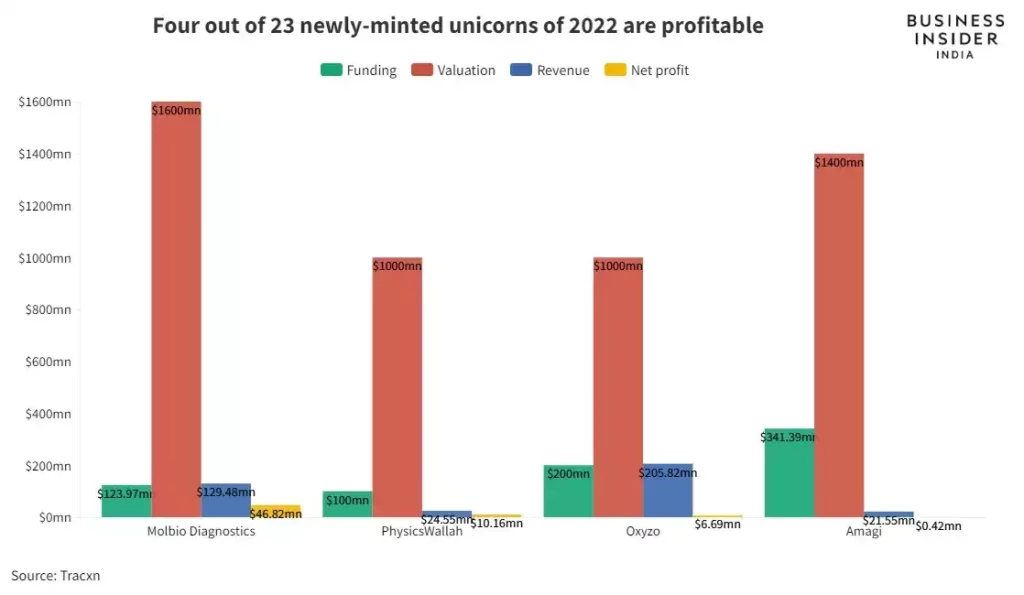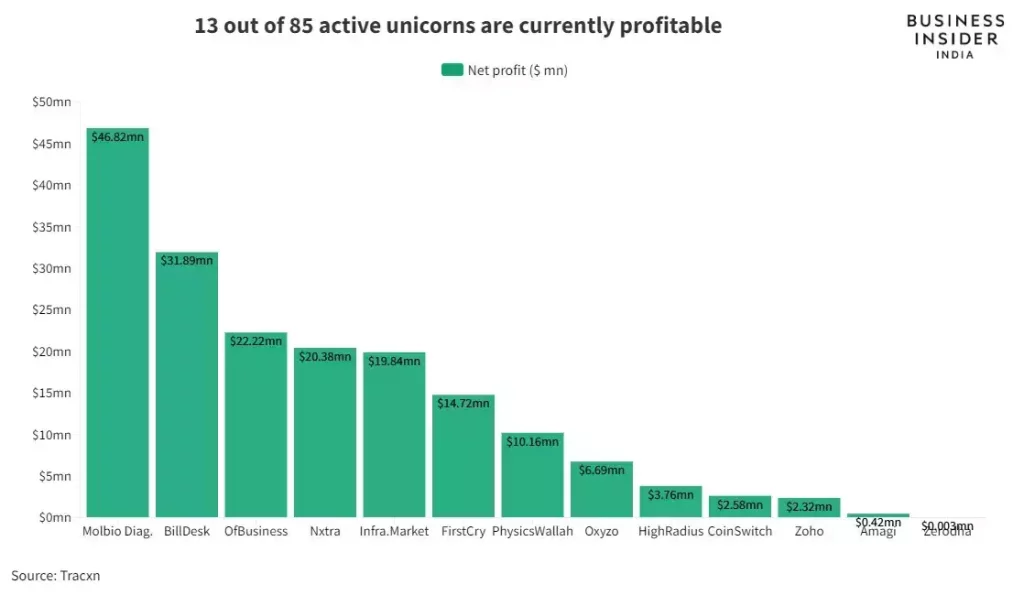Startups in India have started deploying strategies that would put them on the road to profitability in the near future as funding winter sets in. More unicorns are now ditching the “grow at any cost” strategy for profits as their investors are no longer interested in mere customer acquisition growth data, according to an upcoming report from startups and private firms tracker Tracxn. The report shows that four of the 23 Indian startups that became unicorns in 2022 have become profitable now.
All in all, there are 13 startup unicorns in India that are profitable now, according to their most recent financial reports. Traxcn data slightly differ from the PwC report which claims 85 startups in India attaining unicorn status by the end of 2022.
Considering claims made by both reports, it’s justified to claim that nearly 85% of startup unicorns in India are still running into losses.
Among the profitable startup unicorns, Molbio Diagnostics, a company established in 2012, has the most lucrative financial book with the highest profits. It’s a health-tech startup that offers nucleic acids tests to identify infectious diseases. It reports having a net income of $46.8 million, accounting for more than a quarter of the total profits collectively reported by the 13 profitable unicorns in India.
Molbio Diagnostics attained unicorn status, along with PhysicsWallah, Oxyzo and Amagi, in 2022.

PhysicsWallah is an EduTech startup, Oxyzo is a Fintech startup offering business credit. Amagi is an ad-solutions company located in Bengaluru.
Funding winter makes startups shift gears
Funding is a crucial factor in startup survival. However, the onset of the funding winter in the startup world of India, and elsewhere, has forced startups to concentrate on profit to reduce their dependency on investors.
For instance, the four profit-making unicorns of 2022 – Molbio Diagnostics, PhysicsWallah, Amagi and Oxyzo – account for more than a third of the total net profits reported by the 13 profitable unicorns in India.
According to BusinessInsider, citing data from Tracxn, the collective net profit of the four unicorns touched $64.1 million. To put things in perspective, all 13 profitable unicorns in India have reported a total income of $181.82 million.

In total, these 13 lucrative unicorns come from a variety of sectors, including the life sciences and edtech retail, fintech real estate, and many more.
Funding Dries up for startups in India and Abroad
The funding winter – when raising more money becomes too challenging for entrepreneurs due to unfavourable market conditions – is a reality now. Entrepreneurs in Inas well as in other major economies, such as those of the US, UK and China, are finding it too risky to be totally dependent on institutional investors. For well-funded large startups funding winter brings in a lot more challenges as they have to take many extreme measures, including massive layoffs, in a bid to optimise their expenses.
Of the four nations, India saw the second largest year-over-year drop in the total amount raised by startups in 2022. Indian startup entrepreneurs could manage to attract $35.6 billion as an investment in 2022 as compared to $53.7 billion in 2021. That’s a considerable decline of 34 percent and hits tough days ahead. China experienced the most significant drop of 55% as per the Tracxn report.
While the drop in funding amount portrays a worrisome scenario for Indian startups, the number of transactions in India fell by 24%, the highest among the four nations, putting the startups on a real test in 2023.
Late-stage startups in India: No more attractive
The amount of money raised by late-stage startups decreased significantly 52% in 2022, as per the PwC report. This reflects the scepticism of investors in the case of late-stage startups who are now concerned about the valuation of their portfolio companies. The overall number of deals also dropped 18 percent, while the average size of tickets per deal was down by 40% in 2022.
Late-stage startups refer to companies that have products or services on the market and have a good reputation. The early-stage startups have a working prototype or product that has been proven adaptable and looks promising.
However, investors haven’t lost all confidence in startups. This is clearly visible from the investment data related to early-stage startups. Despite the tides, funding in early-stage startups increased 12 percent amounting to $2.8 billion in 2022, up from $2.5 billion in 2021. However, The average size of tickets per deal was constant at $4 million over the period.
Amongst the top five sectors, fintech, Edtech and direct-to-consumer (D2C) witnessed a decline in funding, while the software-as-a-service (SaaS) sector recorded an increase in 2022, making it the most-funded sector, according to PwC.

